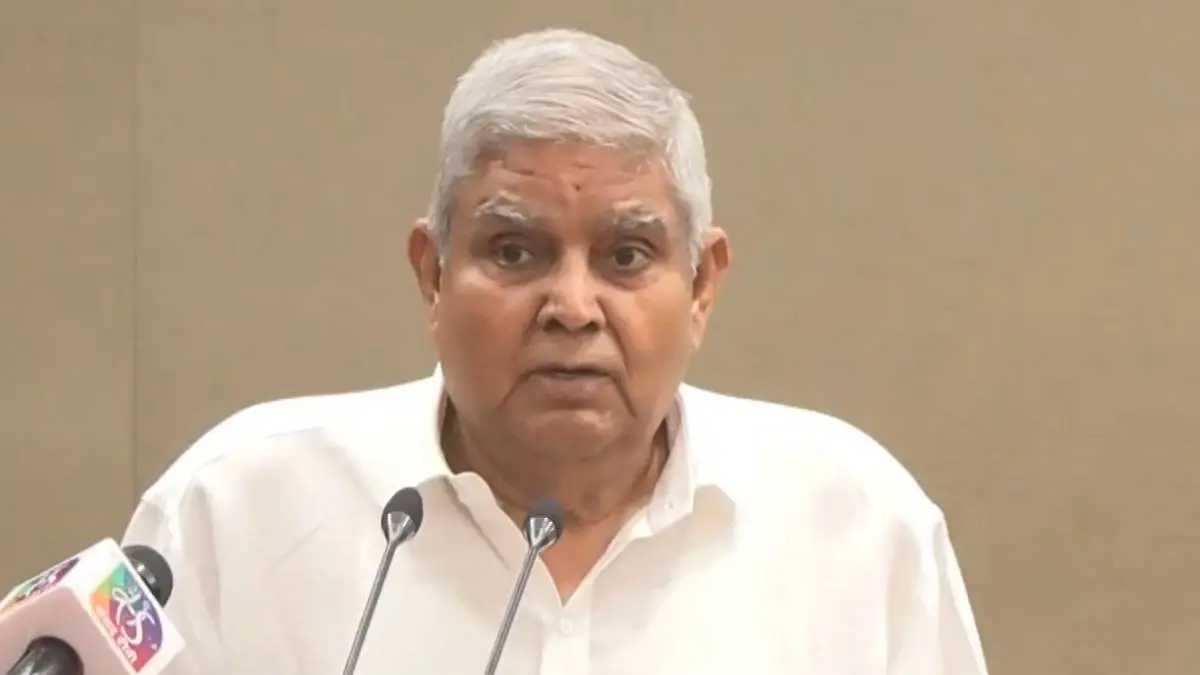Updated 22 April 2025 at 13:08 IST
Parliament Is Supreme: VP Dhankhar Doubles Down, Questions Role of Judiciary During Emergency
This is Dhankhar’s second such remark in just five days, underlining his growing concern over what he perceives as judicial overreach.
- India News
- 4 min read

New Delhi: Reinforcing his position in the ongoing Executive vs Judiciary debate, Vice President Jagdeep Dhankhar on Tuesday reiterated that Parliament stands as the supreme authority in India’s constitutional framework. Addressing an event, Dhankhar emphasised that elected representatives are the ultimate interpreters of the Constitution’s content and that no institution holds power above the will of the people.
‘Parliament is Supreme’
Vice President Dhankhar invoked the 1975 Emergency to highlight the democratic accountability of elected leaders, asserting that even a Prime Minister who imposed Emergency was held accountable in the 1977 elections.
Emphasising the supremacy of Parliament, he said, “Let there be no doubt — the Constitution is for the people and serves as a safeguard through their elected representatives. They are the ultimate masters of what the Constitution’s content will be.”
Dhankhar further stated that the Constitution does not envisage any authority above Parliament. “Parliament is supreme — and in a democracy, that supremacy is on par with the sovereignty of every individual in the country,” he declared.
Advertisement
'Article 142 A Nuclear Missile'
This is Dhankhar’s second such remark in just five days, underlining his growing concern over what he perceives as judicial overreach. His comments come amid an intensifying national discourse over the balance of power between the legislature and the judiciary, especially in the context of judicial scrutiny of laws passed by Parliament.
Last week, while addressing the sixth batch of Rajya Sabha interns, Dhankhar questioned a recent Supreme Court verdict that, according to him, undermines the authority of constitutional functionaries.
Advertisement
Citing the court’s March ruling in the Tamil Nadu Bills case — which termed Governor RN Ravi’s decision to withhold assent to ten bills as “arbitrary” and “illegal” — Dhankhar raised concern over the judiciary issuing directives to the President. “The President of India is a highly elevated constitutional authority, bound by an oath to preserve and protect the Constitution. Now, we see the President being directed by a court. Where are we heading?” he asked.
For the unversed, the Supreme Court had laid down that if a Bill is passed again by a legislature, the Governor must act within a “reasonable” timeframe, interpreted as three months. The verdict also brought Presidential actions under judicial review through Article 201 and advised referring constitutional questions to the Supreme Court.
Taking strong exception, Dhankhar said, “Judges are now legislating, executing, acting as a super-parliament — without any accountability.” A former Supreme Court lawyer himself, the Vice President also criticised the expansive use of Article 142, calling it a “nuclear missile” against democratic institutions, available to the judiciary “24x7.”
Supreme Court Responsible For Inciting Religious Wars
BJP MP Nishikant Dubey has joined the chorus of dissent, questioning the Supreme Court’s recent observations on the Waqf Amendment Act, 2025.
“...Supreme Court is responsible for inciting religious wars in the country. The Supreme Court is going beyond its limits. If one has to go to the Supreme Court for everything, then Parliament and State Assembly should be shut...” Nishikant Dubey had said.
Supreme Court Fires Back
Yesterday, the top court, while responding to advocate Vishnu Shankar Jain’s plea regarding violent incidents in Murshidabad and other regions, appeared to reference controversial remarks made by Vice President Jagdeep Dhankhar and several BJP leaders criticising the court’s judgment on the Tamil Nadu Governor’s powers.
“As it is, we are alleged to be intruding on Parliamentary and Executive functions,” said Justice BR Gavai, who is in line to become the next Chief Justice of India. His remark came in response to the petitioner’s request for a judicial directive to impose President’s Rule in West Bengal.
Get Current Updates on India News, Entertainment News, Cricket News along with Latest News and Web Stories from India and around the world.
Published By : Surabhi Shaurya
Published On: 22 April 2025 at 12:48 IST
